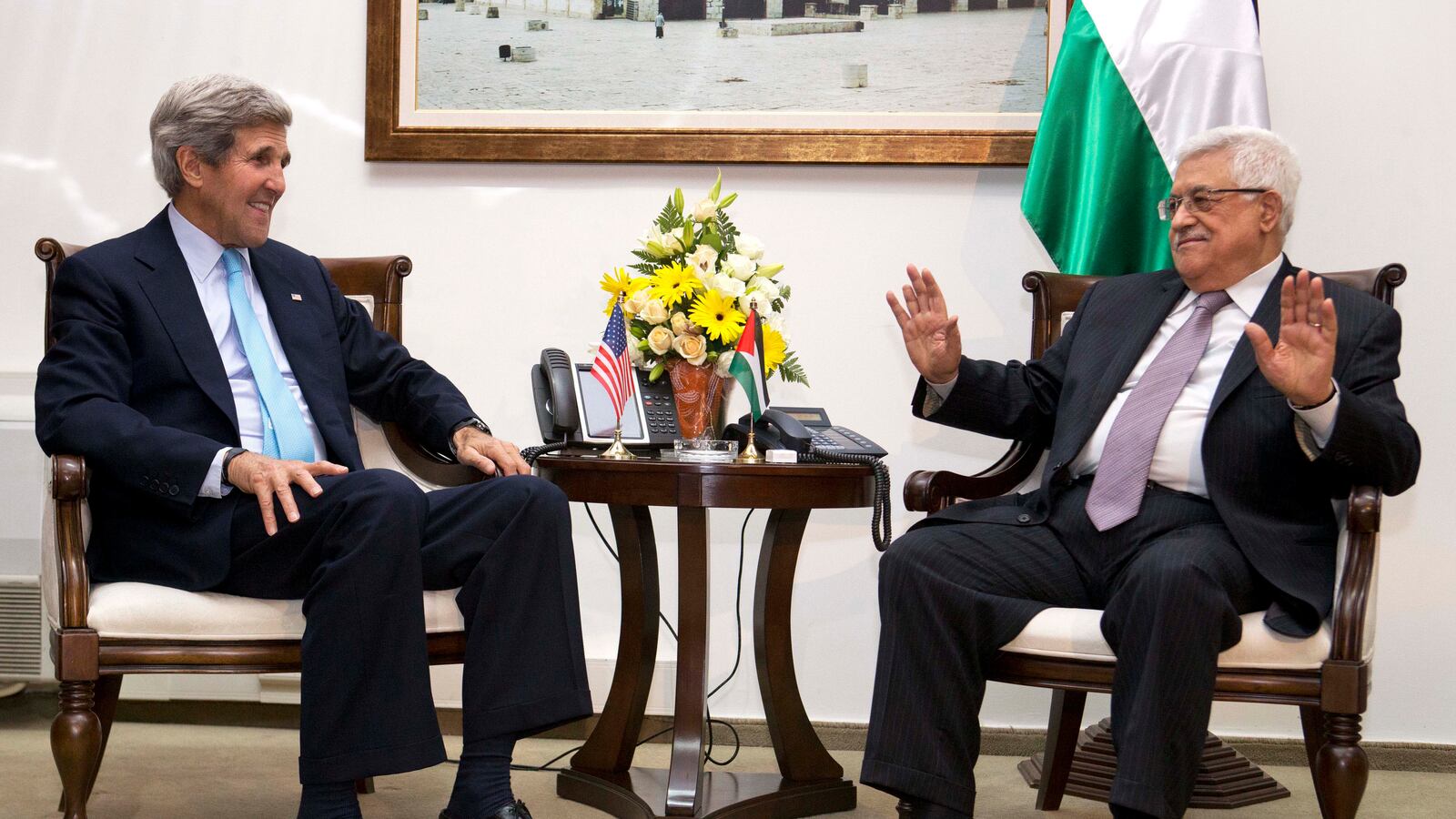“I’m a believer in possibilities,” declared Secretary of State John Kerry as he departed Israel on Sunday, no doubt relieved he could ride an airplane instead of the dead horse of peace talks he has insisted on flogging five times in the past three months.Away from the spotlight, no serious Israeli or Palestinian observer believes there is any chance of reviving the moribund peace process without a dramatic change from one side or another. Inching towards the opposing positions will never bridge the yawning chasm between them.

As Kerry traveled to Ramallah on Sunday for his third meeting with President Mahmoud Abbas in as many days, I was surprised to find myself sitting with a senior Palestinian official. Usually, this man would either be attending such a meeting or receiving minute-by-minute updates by phone. Instead, he was wasting his time with me. When I asked him about the important meeting taking place at the Muqata Presidential compound just a few hundred yards away, he shrugged. “There is no way that Kerry will succeed in arranging a summit with Israel,” he said, dismissing the subject with a wave of his hand.
But Kerry saw the glass as half full. “I feel very positive,” he told reporters as he emerged from the deadlocked meeting with Abbas. Kerry’s optimism is engaging, if naïve, but it’s also dangerous.
After three years of relative quiet on the West Bank, violent incidents from stoning cars to shootings and molotov cocktail attacks have increased dramatically in the past six months, according to Major-General Nitzan Alon, the head of IDF Central Command responsible for the occupied territory.
"If, in a few weeks, the attempt of the American involvement will go with nothing, I'm afraid that we will see this trend of escalation even strengthening," said Alon.
You’d have thought the Americans would have learned their lesson. Remember President Obama’s Cairo speech in June 2009?
"I do have an unyielding belief that all people yearn for certain things: the ability to speak your mind and have a say in how you are governed; confidence in the rule of law and the equal administration of justice; government that is transparent and doesn't steal from the people; the freedom to live as you choose," Obama told the Egyptians.
Noone listening in the hall at Cairo University or watching Obama on television screens throughout the entire Muslim world could fail to grasp the disconnect between the soaring vision of the president and the miserable reality of life under Middle East dictatorship. It wasn’t the only, or even the main, inspiration for the Arab Spring, but Obama’s historic speech contributed in no small way to the feeling that change was just around the corner, adding rhetorical fuel to the dry tinderbox of repression.
Western diplomats may be acting in good faith by raising the expectations of oppressed peoples, but from Tiananmen to Tahrir, ceremonial squares are stained with the blood of believers who bought the promises of freedom broadcast from the western world, only to see them crushed by reality.
When the Muslim world began to rumble, Obama was caught napping. He remained silent during election fraud in Iran and Egypt. The naïve belief that the U.S. could negotiate the minefield of post-revolutionary Libya ended in the death of Ambassador Christopher Stevens. Syrians, still dying by the hundreds each day, wonder what insurance policy gave Bashar Assad freedom from a no-fly zone.
And so to Palestine. While Afghanistan crumbles, Pakistan panics, Turkey trembles, Egypt convulses, Libya bleeds and Syria burns, John Kerry has spent more face time on Israel-Palestine since becoming Secretary of State than any other regional issue. Officials in Jerusalem say Kerry speaks to Israeli Prime Minister Benjamin Netanyahu “every two or three days.” Unfortunately, he has nothing to show for it.
Since taking office in February, Kerry has set a series of deadlines for the resumption of talks, slipping from May to July and now, apparently, to September.
“We have made real progress on this trip, and I believe that with a little more work, the start of final status negotiations could be within reach,” Kerry told reporters on Sunday, which would have been fine if it hadn’t been an almost word-for-word repeat of the press conference he conducted at the end of his third visit back in April.
What will happen when, as seems inevitable, he fails? The people on the ground will find out soon enough. Or perhaps Kerry knows something we don’t.





